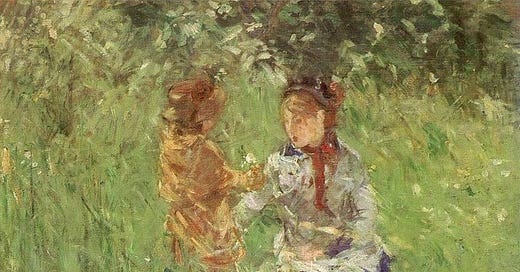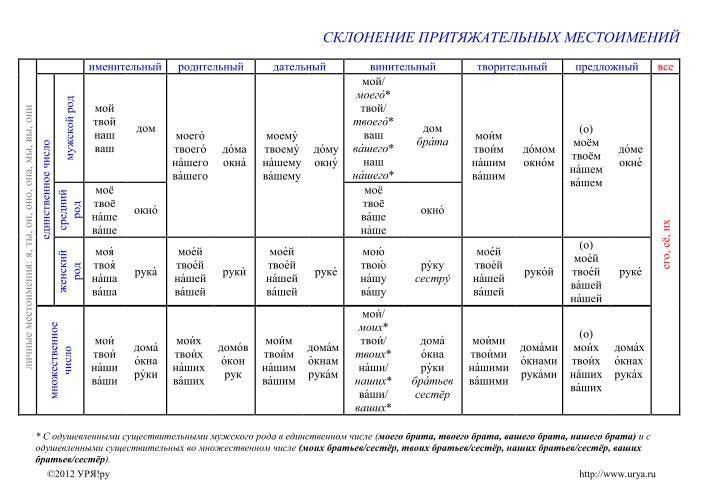Recently моя сестра bought a bun for me. She said that choosing one, she observed a situation when a little kid was screaming “моё!” pointing at every bun at the store. By the way, it happened near моей работы.
Subconsciously, every child uses such a form to show that this toy or that feeling belong to them. In Russian schools, we study possessive pronouns at 2nd year. In the letter, I’d like to talk about a particular pronoun which highlights possession of something as a part of a speaker. Usually, children don’t divide things into groups “theirs” or “stranger’s”.
Даже если мои вечерние гости не могут видеть часы, они должны прочитать время по моему лицу.
— Ральф Уолдо Эмерсон
“Мои” is a plural personal pronoun because the essayist mentioned his friends. Look at the endings, by the way: мои гости.
“Моему” is a singular personal pronoun. And again, the ending: моему лицу.
The table below may help you to see how it changes at every case.
Yes, the cases, again. Perhaps, the toughest part of the Russian grammar, no?
So, here is the first little exercise for you.
1. Это ____ стол. 2. Это ____ ручка. 3. Это ____ карандаш. 4. Это ____ пальто. 5. Это ____ газета. 6. Это ____ друг. 7. Это ____ мать. 8. Это ____ отец.
Now try to find the logic in the given table and find the right endings for the words after pronouns.
главный друг моей жизн__ встретился мне случайно, как судьба!
в команде разделяют мои взгляд__.
публикации моих читател___ подтверждают это.
How was it? Pretty complicated, right? Because when it comes to plural, it brings some mixed feelings. What should we do to ease comprehension?
I wonder, could you notice a conjunction…
мо-я, мо-й, мо-их, мо-его, мо-ей… it’s a marriage of two pronouns! The first part refers to you, who possess, and to the object, which is a part of your existense (in any meaning) but it’s form is up to the genre. His — (мо)его, her — (мо)ей, their — (мо)их…
Try to complete another few setnences.
разобщение между ____ разумом и ____ восприятием.
На ____ личной памяти очень похожая история произошла с ____ собственной родиной, Британией.
Я считаю недопустимым использование ____ имени без ____ согласия.
I just want to remind you about the endings in the following noun: what is the genre?
восприятием (Instr. case) —> восприятие (Nom.case) = what genre is it? Neutral.
Bonus
However, sometimes we say: “Я нашёл свой телефон” or “Я нашёл мой телефон”. Yes, there is one more personal pronoun that refers to any genre. Then you may ask, does it change meaning using “свой”? Not really. Because when it is something “своё” belongs to the acting subject; it just means “personal”, “private”, “my”; it means, it is something close to the subject.
I hope it was useful enough to
Thank you for your attempts to complete 3 tasks and cheer up, the Russian language has its beauty in its complexity.
До скорой встречи!
KEYS
I. мой, моя, мой, моё, моя, мой, моя, мой
II. жизни; взгляды; читателей
III. моим, моим; моей, моей; моего, моего;





